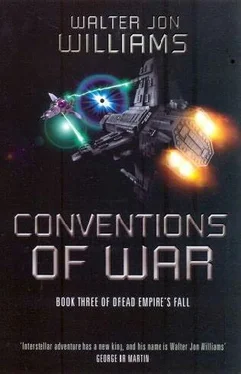Walter Williams - Conventions of War
Здесь есть возможность читать онлайн «Walter Williams - Conventions of War» весь текст электронной книги совершенно бесплатно (целиком полную версию без сокращений). В некоторых случаях можно слушать аудио, скачать через торрент в формате fb2 и присутствует краткое содержание. Жанр: Фантастика и фэнтези, на английском языке. Описание произведения, (предисловие) а так же отзывы посетителей доступны на портале библиотеки ЛибКат.
- Название:Conventions of War
- Автор:
- Жанр:
- Год:неизвестен
- ISBN:нет данных
- Рейтинг книги:5 / 5. Голосов: 1
-
Избранное:Добавить в избранное
- Отзывы:
-
Ваша оценка:
- 100
- 1
- 2
- 3
- 4
- 5
Conventions of War: краткое содержание, описание и аннотация
Предлагаем к чтению аннотацию, описание, краткое содержание или предисловие (зависит от того, что написал сам автор книги «Conventions of War»). Если вы не нашли необходимую информацию о книге — напишите в комментариях, мы постараемся отыскать её.
Conventions of War — читать онлайн бесплатно полную книгу (весь текст) целиком
Ниже представлен текст книги, разбитый по страницам. Система сохранения места последней прочитанной страницы, позволяет с удобством читать онлайн бесплатно книгу «Conventions of War», без необходимости каждый раз заново искать на чём Вы остановились. Поставьте закладку, и сможете в любой момент перейти на страницу, на которой закончили чтение.
Интервал:
Закладка:
The relativistic sensor missiles were racing through the system too swiftly to keep the enemy in their sights for long.
The rest of the system seemed bare, however. The Naxids had cleared away everything for this final combat.
Lady Michi, speaking in the clear, transmitted her demand for surrender. Only time would tell whether the government on Naxas was headed by someone as chatty as Dakzad had been at Magaria.
“My lady,” said Maitland, “I have a preliminary analysis of the enemy. Some of those blips are…well, they’re very large.”
“I’ll take a look.”
She enlarged the sensor image on her display. Some of the blipswere large-not just large, but gigantic, and they were gigantic both in radar and laser-ranging images.
Theycouldn’t have, she thought at once. The war simply hadn’t gone on long enough for the Naxids to have built a squadron of giantPraxis — class battleships like those destroyed at First Magaria. Even under the accelerated building schedules produced in wartime, it would have taken ages to put one of those giants together.
She counted. There were nine overlarge blips. There had only been eight battleships in the entire Fleet, and they had all been destroyed.
The big ships had to be something else.
They had to be warships simply because they were here. There had been plenty of time for all nonwarships to clear the system. But the overlarge blips couldn’t have been built as warships, they had to have beenturned into warships.
They were converted transports, big ones like the vast ships Sula had seen in orbit around Magaria.
“They’re converted merchant ships,” she said, and immediately felt the relief that sighed through Command.
Merchants couldn’t be much of a threat, she thought. In the days after First Magaria, when Zanshaa was expecting a conquering Naxid fleet every minute, a number of small private vessels had been requisitioned by or sold to the Fleet, given a few missile launchers apiece, and sent to patrol the Zanshaa system as “picket ships.” Fortunately, the ridiculous craft had been withdrawn from service before the Naxids had the chance to wipe them from existence.
But these Naxid ships, Sula thought, weren’t yachts and little transports and small merchantmen. These were the largest vessels in existence, bigger even than the oldPraxis — class battleships, even if they weren’t built for war. All that was needed to turn them to warships would be missile batteries, the addition of turrets for point-defense weapons, an electronics upgrade, and extra radiation shielding for the crew compartments and certain other parts of the ship. The craft wouldn’t be very maneuverable, and damage control would probably be worthless, but there would be lots of redundancy. As missile platforms, they would be serviceable enough.
The conversion could probably have been done in a couple months. If the order went out after the Naxids lost Zanshaa, the conversions would start appearing about now, too late for Second Magaria. It was a desperate move, but a reasonably practical one.
Sula began calculating how many missile batteries could be crammed into a space capable of holding ten thousand citizens, like the transports she’d seen at Zanshaa.
The total was frightening.
She asked for a line to Chandra Prasad.
“Yes, my lady?” Chandra said. The camera showed her properly suited, with her helmet in place. Sula, whose helmet was not in place, suddenly felt exposed.
“Those big blips,” Sula said. “They’re large converted transports.”
Distance caused a few seconds’ delay between Sula’s words and the response.
“Yes, my lady,” Chandra said. “We’ve worked that out.”
There was the tiniest bit of condescension in her voice.Yes, we know that, don’t bother us.
“Have you worked out how many missile tubes a large transport can carry? Something like six hundred.”
A few seconds later Sula saw Chandra’s face fall.
“I doubt they carry that many,” Sula said. “For one thing, transport from the magazines would be incredibly complicated. But we shouldn’t dismiss those ships just because they started out as merchants.”
Her tone echoed Chandra’s condescension. It was the least she could do.
“I’ll tell the squadcom,” Chandra said.
Ten seconds later Michi had joined the conversation.
“Sixhundred?” she demanded. “How do you figure that?”
Sula explained. The huge hemispheric hull of a transport had a vast surface area. Each missile launcher took only so much of that surface area. Add it all up, there could be lots of launchers.
Missiles were cheap. Launchers were cheap. The offensive element was the cheapest part of a warship-the most expensive components were the engines, and merchant transports came with those already fitted.
The limitation on the total number of launchers wasn’t a factor of the surface area, but of the amount of plumbing necessary to feed the missile batteries their reloads. Missile batteries needed to be near the magazines, and both the magazines and the batteries needed heavy radiation shielding, and the heavy shielding needed structural support. Sula guessed that most of the big ships were completely empty except where missile batteries had been jury-rigged to the exterior, all on special support struts.
“Thank you for this,” Michi said. There was a little X between her brows, just beneath the bangs. “I’ll give this some thought.”
“No matter how big the ship,” Sula said, “it still takes only one missile to destroy it.”
Michi gave a weary smile. “I’ll bear that in mind, Captain.”
Michi had two days to think about the converted transports, because at the current rate of closing it would take that long for Chenforce to catch the enemy. The Naxids could always maintain distance, but they would still have to fight before they got to Naxas.
Sula knew the battle was going to happen wherever the Naxids wanted it to. If Michi had adopted her suggestion and pressed the pursuit without decelerating, she would have caught the enemy-before the reinforcement could have caught up with the Magaria survivors. She would have destroyed the Magaria contingent and then swept on to Naxas before the converted transports could have interfered.
She didn’t mourn Michi’s decision. At least Michi had reasons for what she did, not useless prejudices like Tork.
There was no reply to Michi’s demand for surrender. Sula considered this yet more evidence that Dakzad was dead. She hoped his replacement was equally old and useless.
The two days to the Battle of Naxas was filled with activity. Officers and sensor techs scrutinized displays, trying to figure which return signal meant a genuine warship and which did not. The Magaria survivors were known quantities, but the reinforcements weren’t. The nine overlarge signals were real ships, and it was decided that at least two of the others were genuine, though whether real warships or converted civilian craft, it was impossible to say. They seemed to be the size of frigates.
The analysis was all performed under heavy deceleration. Increased gravities strained bodies and slowed minds. Sula stuck one med patch after another on her neck, twitched through dreams of disconnected horror, and fueled herself with coffee and sweets.
Michi gave Chenforce another three-hour break before the engagement, a few blessed hours under low gravity for the crew to have a hot meal and a few hours to relax the knots that heavy gravities had put in their muscles.
Sula called a drill instead. She was worried that Squadron 17 might have lost its edge in the long, dull prelude to the battle.
After the drill, she was glad she’d spoiled her crews’ quiet moment, because her ships performed raggedly. She issued a series of brisk corrections, then had the crouchbacks’ meal served at their stations.
Читать дальшеИнтервал:
Закладка:
Похожие книги на «Conventions of War»
Представляем Вашему вниманию похожие книги на «Conventions of War» списком для выбора. Мы отобрали схожую по названию и смыслу литературу в надежде предоставить читателям больше вариантов отыскать новые, интересные, ещё непрочитанные произведения.
Обсуждение, отзывы о книге «Conventions of War» и просто собственные мнения читателей. Оставьте ваши комментарии, напишите, что Вы думаете о произведении, его смысле или главных героях. Укажите что конкретно понравилось, а что нет, и почему Вы так считаете.











